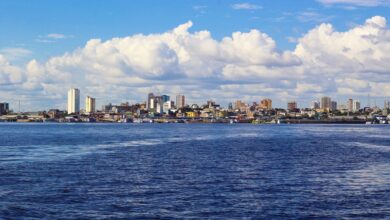Climate Justice: The Financing Of Environmental Projects Affects Latin America
Ironically, the countries that pollute the most are the ones that suffer the least from the effects of global warming, in addition to being the ones that would be assuming the least responsibility in the face of this situation, according to a study by the University of Sussex .

Photo: Freepik
LatinAmerican Post | Christopher Ramírez
Listen to this article
Leer en español: Justicia Climática: la financiación de proyectos ambientales afecta a América Latina
Climate change, more than a simple thesis managed by "desperate environmentalists" is a reality that the United Nations (UN) itself has assumed for more than 30 years, with most of the world powers as the most responsible for this crisis. environmental.
“Many people think that climate change mainly means warmer temperatures. But the rise in temperature is only the beginning of the story. Since the Earth is a system, in which everything is connected, changes in one area can influence changes in all the others , ”explains the UN, ensuring that the increase in heat is only one of the many self-destructive consequences that the human being has exerted on the planet in the last two centuries.
According to information from this international organization, “the consequences of climate change now include, among others, intense droughts, water shortages, severe fires, rising sea levels, floods, melting of the poles, catastrophic storms and a decrease in biodiversity. ”.
However, this situation, more than complaints, requires real political, economic and social action with which to be able to withstand the changes that the Intergovernmental Panel on Climate Change (IPCC) detailed in the Sixth Assessment Report developed in 2021 , in which, although, in summary, global warming is confirmed, it also gives hope that it is time to achieve a real change.
Climate injustice
Now, to counteract the catastrophic effects of global warming, it is not only necessary to adopt a change of mentality, but also a much more realistic position of who or who are the most responsible for this world crisis and the way in which they are contributing to the fight against polluting activities on the planet.
According to a new study by the Business School of the University of Sussex (United Kingdom) , of the more than 2,200 million dollars destined for more than a thousand environmental projects, at least 36% were destined for adaptation to climate change, while climate mitigation through energy systems, as well as transportation and mobility received 28% and 13%, respectively. For its part, geoengineering received 12% of this budget and industrial decarbonization 11%.
However, although the money is there and has been invested to counteract the negative effects of global warming, as well as the actions that have led to it, the truth is that these investments have not been made fairly throughout the planet. The Suxxes University report, developed by the Science Policy Research Unit (SPRU), confirmed that “climate research funding over the last three decades has been distributed asymmetrically with the UK ( 40%), the European Union (27%) and the United States (11%) receiving nearly four-fifths of all funds disbursed for a sample of 1,000 projects analyzed by the researchers.”
Thus, the study also adds that developing countries (Latin America and Africa) barely appear on the list of territories that receive part of the investment for the fight against climate change.
“The vastly disproportionate funding given to the UK, the US and the European Union adversely affects low-income countries disproportionately in achieving just transitions (…) it is clear that this is a significant failure to support a truly global response. to the world's biggest challenge,” said Benjamin Sovacool, Professor of Energy Policy at SPRU, University of Sussex Business School.
It may interest you: What Are Carbon Bonds and Why Are They So Criticized?
Latin America, a discriminated area?
The worst thing about this situation is that the so-called Climate Justice is not only not visible in economic terms, but also in social terms. The NGO Ayuda en Acción explains that "climate change (…) is a political and ethical issue", which unfortunately is not addressed as such by the world powers.
According to the World Bank, although only one-sixth of the world's population lives in high-income countries, they emit 44 times more carbon dioxide (CO2) than the low-income countries in which most of the world's population live. Humans.
For its part, the International Resource Panel (IRP) indicates that the countries with the highest Gross Domestic Product (GDP) are also the ones that consume the most resources: at least ten times more than the poorest countries in the world.
And this is what the Germanwatch Global Climate Risk Index (CRI) reflects , which through a map developed in 2020 shows, precisely, that they are the countries that have been invested the most money for climate change, the who least need it. The list of countries most affected in the last 20 years by climatic events of great destruction, derived from global warming, is led by Puerto Rico, Myanmar and Haiti; that is, two of the Top 3 nations are in the Latin American zone.
“The most impoverished people and countries are the ones that are suffering the most from this crisis (that of climate change), despite being precisely the ones that bear the least responsibility”, concludes Ayuda en Acción.




